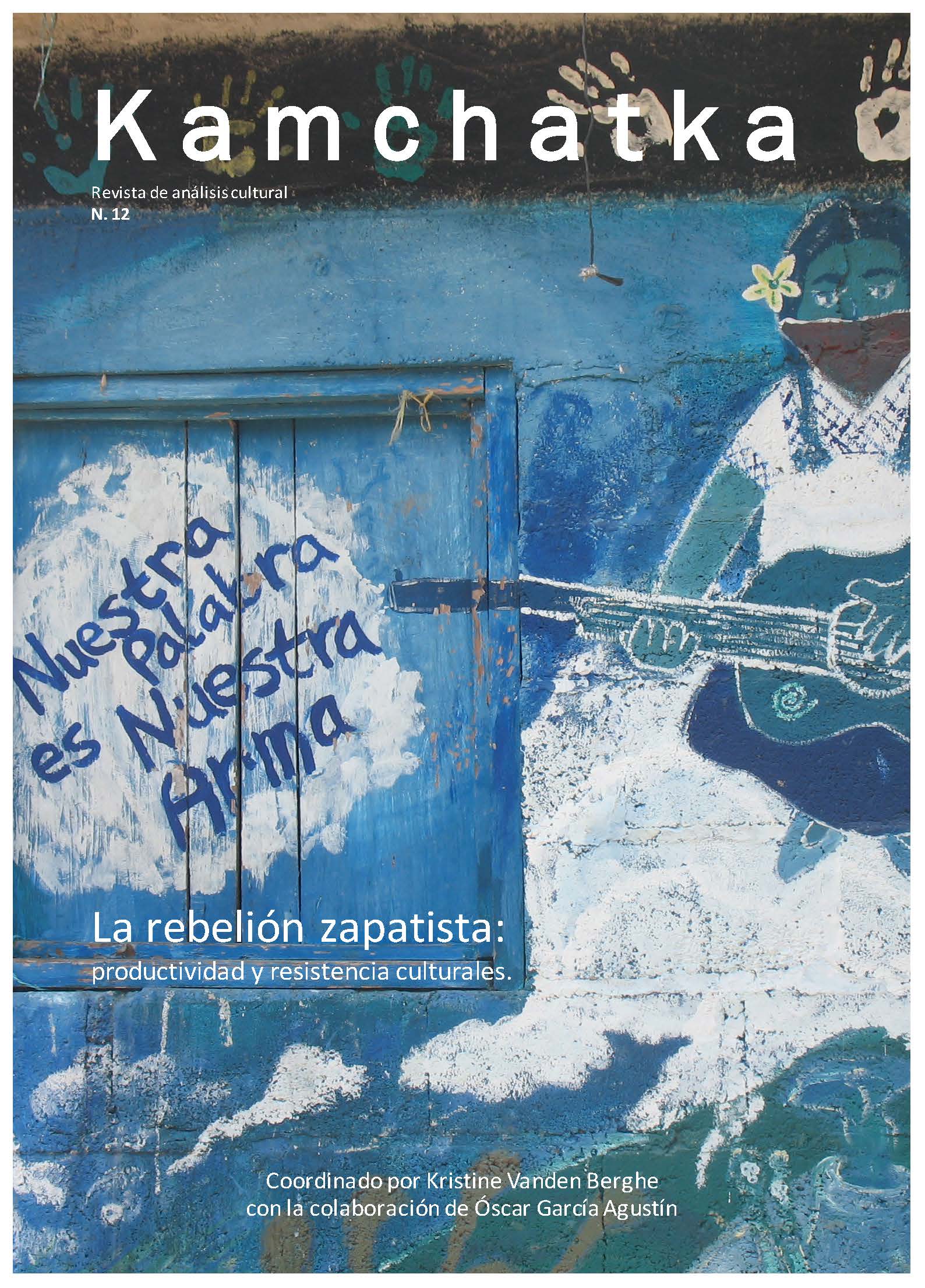The caracol and the beetle. A tension between ideology and form in the EZLN’s literary production
DOI:
https://doi.org/10.7203/KAM.12.12357Keywords:
Durito, social acceleration, zapatista discourse, Marcos Abstract
Abstract
In this contribution I will concentrate on the relation between ideology and form in the realm of the Zapatista upraising in Chiapas and more specifically in the tales about a character named Durito written by Subcomandante Marcos. For this purpose I will depart from the theoretical insights about the acceleration proposed by the German sociologist Hartmut Rosa (2005), also occasionnaly relating these insights with thoughts of the British-Polish sociologist and philosopher Zygmunt Bauman (2000), a thinker who had a major influence on Rosa, and of the French philosopher Gilles Lipovetsky (1983) who, just as Rosa and Bauman do, examines the connection between postmodernity and time. I start with highlighting those elements of the Zapatista uprising that are significant in relation to the theory of Rosa, which I will briefly present in a second part. I will then read the narrative about the beetle Durito in the light of this theory and propose some reflections concerning how form and ideology relate in them.
 Downloads
Downloads
 References
References
Alberca, Manuel (2007). El pacto ambiguo. De la novela autobiográfica a la autoficción. Madrid: Biblioteca Nueva. Colección: Estudios Críticos de la literatura, 30.
Arias, Arturo (2007). Taking Their Word. Literature and the Signs of Central America. Minneapolis/London: University of Minnesota Press.
Augé, Marc (2008 [1992]). Non-places. An Introduction to Supermodernity. London/New York: Verso.
Bauman, Zygmunt (2000). Liquid Modernity. Cambridge: Polity.
Burbach, Roger, Jeffries, Fiona y Robinson, William J. (2001). Globalization and Postmodern Politics. From Zapatistas to High-Tech Robber Barons. London/Sterling: Pluto Press; Kingston: Arawak Publications.
De Vos, Jan (2002). Una tierra para sembrar sueños. Historia reciente de la Selva Lacandona 1950-2000. México: FCE/Centro de Investigaciones y Estudios Superiores en Antropología Social.
Ejército Zapatista de Liberación Nacional (2003). Documentos y comunicados 4. México: Era.
García Agustín, Óscar (2006). Comunicación zapatista. Contrapoder y acción política. Madrid: Editorial Manuscritos.
Gelman, Juan (1996). “Nada que ver con las armas”. La Jornada, 21 April.
Huffschmid, Anne (2002). Diskursguerilla: Wortergreifung und Wider-Sinn. Die Zapatistas im Spiegel der mexikanischen und internationalen Öffentlichkeit. Tesis doctoral, Universität Dortmund.
Le Bot, Yvon (1997). Subcomandante Marcos. El sueño zapatista. Barcelona: Plaza & Janés.
Lipovetsky, Gilles (1983). L’ère du vide. Essais sur l’individualisme contemporain. Paris: Gallimard. Les Essais CCXXV.
Montesano Montessori, Nicolina (2009). A discursive analysis of a struggle for hegemony in Mexico. The Zapatista movement versus President Salinas de Gortari. Saarbrücken: VDM Verlag Dr. Müller.
Paz, Octavio. “La Selva Lacandona”. Vuelta, 231 (1996): 8-12.
Rosa, Hartmut. “Social acceleration: ethical and political consequences of a desynchronized high-speed society”. Constellations. An International Journal of Critical and Democratic Theory, 10(1) (2003): 3-33.
Rosa, Hartmut (2009). “Social acceleration: Ethical and Political Consequences of a Desynchronized High-Speed Society”. Rosa, Hartmut and Scheuerman, William E. (eds.). High-Speed Society. Social acceleration, power, and modernity. Pennsylvania: The Pennsylvania State University Press: 77-112.
Sous-Commandant Marcos (et al.) (2001), ¡Ya basta! Les insurgés zapatistes racontent la révolte au Chiapas. París: Dagorno.
Subcomandante Marcos (1999). Don Durito de la Lacandona. San Cristóbal de las Casas: CIACH.
Vanden Berghe, Kristine (2005). Narrativa de la rebelión zapatista. Los relatos del Subcomandante Marcos. Madrid/Frankfurt: Iberoamericana/Vervuert.
Vanden Berghe, Kristine (2009). “The Quixote in the Stories of Subcomandante Marcos”. D’haen, Theo and Dhondt, Reindert (eds.). International Don Quixote. Amsterdam: Rodopi, Textxet, 57: 53-69.
Vanden Berghe, Kristine (2012). Las novelas de la rebelión zapatista. Oxford: Peter Lang. Hispanic Studies: Culture and Ideas, 49.
Van Tongeren, Carlos (2015). Trayectorias del compromiso. Comicidad y melancolía en la narrativa policíaca de Manuel Vázquez Montalbán, Paco Ignacio Taibo II y Leonardo Padura Fuentes. Tesis doctoral inédita. Nijmegen: Radboud Universiteit.
Vázquez Montalbán, Manuel (1999). Marcos: el señor de los espejos. Madrid: Aguilar.
Zibechi, Raúl (2013). “Autonomous Zapatista Education: The Little Schools of Below”. La Jornada, 23 August.
Downloads
Published
How to Cite
-
Abstract2134
-
Artículo504
Issue
Section
License
This journal provides an immediate free access to the content on the principle that freely make investigation available to the public, which promotes an increased global knowledge exchange.
Unless otherwise indicated, texts published in this journal are under the license Attribution-NonComercial 4.0 by Creative Commons. These texts may be copied, distributed and publicly communicated whenever the publication’s author and title are quoted and whenever they are not used for commercial purposes. In any case, intellectual property of the articles and its potential economic rights entirely belong to its authors.
The full license can be consulted on https://creativecommons.org/licenses/by-nc/4.0/. We encourage authors to disseminate papers published in Kamchatka. Journal of cultural analysis electronically, in institutional digital repository or in their websites.





